- Home
- Blake Pierce
Face of Murder (A Zoe Prime Mystery—Book 2) Page 7
Face of Murder (A Zoe Prime Mystery—Book 2) Read online
Page 7
He shrank in the seat and watched, watched them, waited for something. The third one. The third brains like snakes, it had to be. The sky formed—ribbons like murky water to fall above him, falling, falling. The doctor was getting wet. He went back to the hospital. The other man ran the distance to his refuge and got in and slammed the window shut behind him.
That man, that man! Blast that man and damned him and let him rot in—in space! He ruined it all! The man’s engine started, the light was on through the window, the thrum-thrum of the car moved away. The sky ribbons fell and fell like tears from above, like the whole sky could feel how he was feeling.
And who could know how he was feeling? All of it gone, lost, vanished on the wind like smoke from a—cannon. Disappeared and gone. His mind, his brilliant, beautiful mind. It was everything.
Now the snakes were crawling around up there and the doctor was on call all night and the lights were going on around him and the people ran under ribbons falling so fast. The window mist was the fog in his head, the pain, the words falling like snakes and ribbons.
He covered his eyes until the headache subsided and drove away, back home, back to wait for another chance. He had to make the doctor pay.
CHAPTER ELEVEN
Zoe was already wide awake, dressed and ready to go, when her alarm went off in the morning. It had been a restless night, and almost a sleepless one. She had tormented herself all night long, before rising sleep-deprived and groggy to admit defeat.
Even if sleep eluded her, she was determined that the answer to the equations would not. She had some of the finest minds in the math world on the case; even if she was not good enough to figure them out herself, someone else would. That was the mantra she soothed herself with as she drove to the field office, sipping hot coffee and only just managing to concentrate on the road.
She had barely stepped two feet into the office when her cell rang.
“Zoe,” Dr. Applewhite exclaimed breathlessly down the phone.
Zoe was instantly on alert, her body tensing. “Have you discovered something?” she asked.
“No. Well, yes.” Dr. Applewhite hesitated. Zoe got the impression of movement from the noise in the background of the call: rustling papers and fabrics, footsteps pacing, the unusual cadence of Dr. Applewhite’s voice. She was pacing backward and forward. “I’ve heard back from most of the contacts I reached out to. You know what mathematicians are like; can’t resist a challenge. Most of them had a bit of a sleepless night.”
Zoe refrained from admitting that she had had the same experience. The less small talk the better; she wanted the answer, and she wanted it now. “Go on.”
“Well, here’s the thing. They, almost all of them, said the same thing. All agreed they couldn’t solve it—couldn’t make any real headway. But these are some of the best minds in the world, Zoe—really, the sharpest. If they can’t solve it… anyway, they tell me the equations are impossible. A few of them even asked me if it was possible that a practical joke had been played on me. Because, you see—what they think is—the equations are wrong.”
There was a beat. Zoe retraced the conversation mentally, Dr. Applewhite’s last word hanging in her ears. Had she really heard it correctly? “Wrong?”
“Precisely. Whoever wrote them down—well, they’re either writing gibberish, or they don’t understand what they’re writing. Several parts of it are just garbled, just absolute nonsense. There’s no wonder you couldn’t get anywhere with it. No one can.”
Zoe started pacing up and down, mirroring the frantic actions of her mentor, who was clearly just as excited about all of this as Zoe herself. Except that now something was wrong, something heavy sitting inside her chest and threatening to choke her. Wrong? Could that really be the case?
“I do not understand,” Zoe admitted, glancing up as the door opened to admit Shelley.
“I just don’t think your killer even knows what they’re writing on the bodies. This really widens things up, don’t you think? Realistically, if they’re so hard that not even our best and brightest can solve them, you would be looking for the best mathematician in the world. The odds of that happening are very low, you must admit.”
“Astronomically low,” Zoe muttered in reply, closing her eyes briefly against the deluge of calculations that instantly appeared in her mind, zeroes spiraling off into the distance.
Shelley was giving her a questioning frown as she settled her handbag down on a chair and removed her jacket, watching her carefully. Zoe turned away so that she didn’t have to meet her gaze. There was too much to explain, and unlike others who could seemingly multitask, Zoe had never been good at carrying on two conversations at once.
“It seems the most logical explanation would be that this person is simply, well, damaged. Psychologically speaking. A schizophrenic with paranoid delusions, or so forth. Perhaps they think they are writing down something of great importance. Maybe they believe it is a message from God, even. The point is, they have some kind of mental problem. There’s no math in it at all.”
That heavy stone of disappointment had settled firmly in Zoe’s stomach. It didn’t feel right. None of it felt right. But how much of that was her own desire to be right about the importance of the writing? She couldn’t be sure. “Right,” she said, hearing her own voice distantly. “I will take that into account as we investigate further.”
There was a pause on the other end, before Dr. Applewhite spoke again, softer and soothingly. “Zoe, I know it must be difficult to take in. I understand that you wanted the equations to mean something. The thing is, they simply don’t.”
“I hear you,” Zoe said. It was the only truth she could offer just then. “Thank you for going to all of this trouble for me.”
Dr. Applewhite was making overtures of kindness, suggesting that she would do anything Zoe needed, but Zoe had already begun to tune her out. She was looking at the blown-up photographs of the equations, printed in a scrawling hand across the torsos of two dead men.
“I will talk to you again soon,” she said, hanging up the call. She did not have enough presence of mind to know whether Dr. Applewhite had been in mid-sentence when she interrupted.
“Is it bad news?” Shelley asked, quietly.
Zoe had almost forgotten she was in the room. “My contact, for the math professors. They do not feel that there is any lead in the equations. Apparently, they are impossible to solve. The word used was ‘gibberish.’”
Shelley took a breath, blew out a whistle. “Wow. Are we sure about that?”
Zoe searched within herself, trying to find the answer. Did she really believe it? “I do not know,” she said, at last. “It does not feel right. I thought these equations were the key to solving it all. I—I still do. How can they be meaningless?”
Shelley circled their desks to stand next to Zoe, looking down at the pictures. She patted Zoe’s hand lightly, then tapped one of the images. “They aren’t meaningless. Not to us. Even if the equations have no solution, these were written by our perpetrator. That means they have a lot of clues for us. State of mind, handwriting, even the pen he used. That’s forensic evidence. We can still use these to put him behind bars.”
“Or her,” Zoe said automatically, though it was true that the physical evidence suggested the strength of a male. Still, she had been caught out by that once in the past. A woman who had trained as a wrestler, the musculature on her arms far above that of the average female—or male, for that matter. Her strength had been enough to snuff out a life without need for any tools other than her own body.
“All hope is not lost, is what I’m saying.”
Zoe continued to stare down at the images. If Dr. Applewhite was right, Zoe had just wasted some of the most crucial hours of the case fixating on something that meant nothing. And she had been so sure. Could this really be meaningless? Really?
“You aren’t the only one who had trouble sleeping,” Shelley said, giving Zoe a sympathetic smile. Zoe briefly wondered ho
w Shelley could tell, but then, she hadn’t looked in a mirror that morning. The bags under her eyes were probably deeper and darker than ever. “I spent a few hours searching online. Take a look at these.”
She had a sheath of papers that she was distributing across the desk, covering over the crime scene photographs. Zoe wanted to protest, but she held herself back. She would sound petty. Like she couldn’t let the equation theory go.
She didn’t want to let it go, but that was beside the point. When people wanted her to forget something, and she didn’t, there were often arguments and interventions set to follow. Zoe didn’t want that. She could at least pretend she was getting over it, in front of others.
“These two are from local papers, and those are from scientific journals,” Shelley was explaining, pointing at the various printouts. Each of them bore a photograph of the same man, some from different angles; the headlines were all inflammatory. “See here? Professor loses post over controversy. It sounds like this guy got into a pretty public showdown. He was a fairly well-respected theoretical physicist, until he got into an argument with another professor. Things escalated, words turned to blows. The police intervened, and it turns out our guy was drunk on the job. He lost his position, and his reputation hit the rocks. Students and colleagues started coming out of the woodwork, accusing him of inappropriate conduct because of his alcoholism.”
“And he was teaching here?” Zoe asked, nodding as she followed the story. It was a convincing picture. A man with an ax to grind.
“Yes. And here’s the best part.” Shelley paused, flashing Zoe a smile. “Guess who the other professor was.”
Zoe’s eyes had already picked out the name in the text as she scanned it. “Professor Ralph Henderson. Our second victim.”
“Bingo,” Shelley said, grabbing the papers back into a pile and shoving them into her bag. “I have his home address. Reportedly, he hasn’t been able to get work for the past few months since this happened, so I imagine we will find him there.”
“Then we should go,” Zoe said, heading for the door herself. She did not need to turn around to know that Shelley would be right behind her.
Even if nothing else was panning out the way that she wanted it to, a solved case was a solved case. If this ex-professor was behind it all, it would be disappointing—but there would be a killer taken off the streets before any more lives were lost.
That, Zoe reminded herself as they headed for the parking garage, was what really mattered.
Even so, she couldn’t shake that niggling doubt at the back of her min, that this case wasn’t going to be wrapped up so easily.
CHAPTER TWELVE
Zoe drove as Shelley worked from her laptop, hooked up to a Wi-Fi dongle. It was the most efficient way to both look up their new suspect and reach him as quickly as possible.
Zoe conceded that there was a lot to like about James Wardenford, as far as suspects went. Shelley read seven newspaper clippings to her as they drove: each told the story of a man who was used to respect, to recognition, and to a good reputation. He had lost all of it. Stronger men would have struggled to cope.
But an alcoholic?
For him, it must have sent him off the rails.
That would neatly tie a few things up. Zoe started to feel more excited about the idea, the closer they got to his home. As a theoretical physicist he would have been no stranger to complex math equations, but as a perpetual drunkard, he might have lost his ability to express them properly. Maybe he thought that what he was writing made perfect sense.
There was a little disconnect between the idea of someone so drunk they could not write correctly, yet sober enough to kill a man and leave so little evidence they had so far gotten away with it. But that was a detail Zoe was willing to let slide until they had actually spoken to him. Functioning alcoholism meant different things for different people.
They pulled up outside an apartment block, with small yet neatly maintained units clearly visible from the ground. The balconies outside each set of French doors held rose bushes in pots, bicycles, small outdoor table and chair sets. It was a nice place. The kind of building you might retire to on a modest yet comfortable pension.
The kind of place a once-well-paid professor and physicist might retreat to once his paychecks weren’t so guaranteed anymore.
Apartment buildings were often a little tricky. When someone came to the front door of a house and saw the police there, they had no choice but to talk. Ringing an intercom and asking for entry meant that it could be denied.
Zoe looked up as they walked toward the front door, taking in the windows that she could see. One set of French doors was open, the curtain blowing slightly in the breeze. She made a quick calculation: third floor, fourth door along. If the building was numbered in a logical way from the left front corner, she could get them in a little easier.
She pressed three-zero-four on the intercom panel, and waited for it to connect.
Shelley was checking her notes, no doubt remembering that James Wardenford was not in fact an inhabitant of 304, but before she could protest, the call connected.
“Hello?”
“Hello, ma’am. I have a delivery.”
Zoe caught Shelley’s eye, shrugged, and looked back at the intercom.
“Sure, come in.”
The entrance door buzzed and clicked, indicating that it had been unlocked. Zoe pushed through and started up the stairs, heading for the apartment that really did belong to their suspect.
“What are we delivering?” Shelley asked, a little primly. Rookie agents were always sticklers for the rules. Except for the ones that weren’t, and ended their careers quickly. She would learn to loosen up over time.
“Justice,” Zoe said, after some thought.
Shelley’s peals of laughter burst through the narrow staircase, echoing from the walls. “I like that,” she said, once the worst of her mirth had subsided.
The apartment was on the second floor, at the opposite side of the building from where they had come in. Zoe thought it a shame they hadn’t had more opportunity to gain some clues as to Wardenford’s state of mind from the exterior, but you made do with what you had. The lock on his apartment door was surrounded by scrape marks, an early clue to a habitual drunk. He missed the keyhole often, unable to see it clearly.
Zoe rapped sharply on the door as Shelley joined her, just slightly out of breath from the climb.
There was a rolling, crashing noise from within, then a few unsteady, heavy footsteps. “Jus’a minute,” a male voice slurred.
“Bet he’s real popular with the downstairs neighbors,” Shelley muttered.
Zoe simply waited. Her patience was rewarded. James Wardenford cracked open his door without bothering to engage the safety chain, leaning on the walls of his own corridor for support as he eyed them with a squint.
He was wearing only a bathrobe one size too big for him, left open to the waist, and a pair of old, stained shorts. His feet were muffled now by worn slippers, the threadbare soles almost gone at the front. There was still a bottle of beer in his hand, two-thirds empty.
“Good morning, James Wardenford,” Zoe said, deliberately raising her voice a notch. “My name is Special Agent Zoe Prime, and this is Special Agent Shelley Rose.”
Normally there was a reaction at this point. The suspect would try to run somehow, or stammer, or shrink back in fear. Or they would blink far too quickly, take in rapid breaths, other signs that Zoe had come to recognize.
Wardenford, whether due to his drunken state or something else, barely reacted at all.
“Yup,” he acknowledged. “Better come in while I get some clothes on.”
Shelley shot Zoe a puzzled look. “We’d like to talk to you about—”
“Yeah, yeah,” Wardenford said, waving a hand dismissively. “Henderson. I know. I can’t go to your station, or whatever you call it, like this.”
He shuffled away from the door, leaving it swinging open. Zoe hesitated for a
moment, unaccustomed to such a reaction, before taking the initiative to follow him inside.
The thin foyer gave on to doors in all three directions, one of them lying open ahead. It was clearly a living area, a small sofa perched in front of a television, and Zoe ducked inside. Shelley closed the door and stayed there, nodding to Zoe when she glanced back. She would guard the exit. A wise move. It wouldn’t do to have him dart past them and out to freedom while they lounged around on his sofa.
Not that his sofa was much use, Zoe saw as she approached it. There were seventeen empty beer bottles scattered on the sofa, coffee table, floor, and other odd points of the room. Among them nestled a further three whiskey bottles and four of vodka—this, then, was a man not particularly fussy about his drink so long as it did the job of getting him drunk.
There was only a foot between the edge of the coffee table and the sofa. The repeated stains on the carpet, gouges in the wood, and watermarks on the fabric of the cushions indicated that it was frequently too small a gap for an inebriated man holding a glass or bottle ready to spill or drop. Two pizza boxes were stacked haphazardly on top of the trash can, and packaging for five microwaveable meals around it. It seemed he had given up on opening the trash can to dispose of his waste after blocking access himself. Across the open-plan room, the kitchen looked pitifully underused.
The story needed no further investigation. He was an alcoholic, as they already knew, and he had clearly been binge-drinking for some time.
Wardenford emerged noisily from another of the doors in the corridor. As Zoe joined him, she gained a glimpse of a bedroom strewn with clothes and the wafting scent of old vomit.
“Right, then,” he said, finishing off the last button on a crumpled shirt. “Off we go. Do you need to put handcuffs on me, or is it more informal than that?”
Zoe blinked. She had made a lot of arrests, and she had taken a lot of people in for questioning. She could not recall a single one of all those people ever volunteering to be cuffed.

_preview.jpg) Once Gone (a Riley Paige Mystery--Book #1)
Once Gone (a Riley Paige Mystery--Book #1)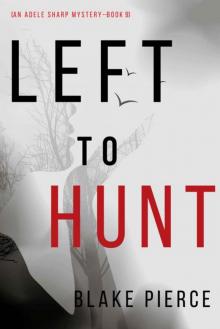 Left to Hunt (An Adele Sharp Mystery—Book Nine)
Left to Hunt (An Adele Sharp Mystery—Book Nine)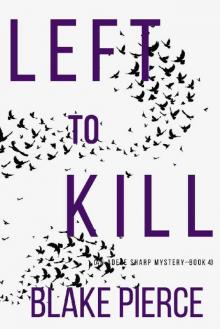 Left to Kill (An Adele Sharp Mystery—Book Four)
Left to Kill (An Adele Sharp Mystery—Book Four)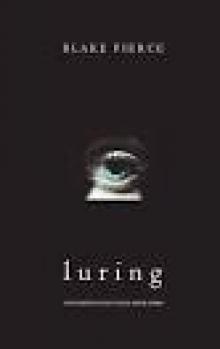 LURING
LURING If She Hid
If She Hid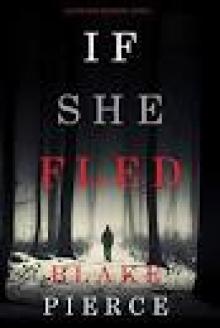 If She Fled
If She Fled Already Gone (A Laura Frost FBI Suspense Thriller—Book 1)
Already Gone (A Laura Frost FBI Suspense Thriller—Book 1) Vengeance in Vienna
Vengeance in Vienna Once Shunned
Once Shunned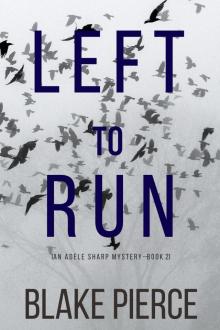 Left To Run
Left To Run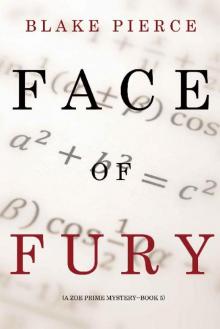 Face of Fury (A Zoe Prime Mystery--Book 5)
Face of Fury (A Zoe Prime Mystery--Book 5)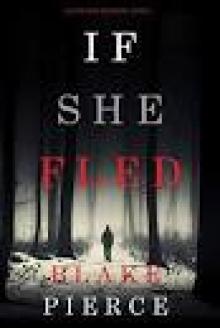 Blake Pierce - Kate Wise - 5 - If She Fled
Blake Pierce - Kate Wise - 5 - If She Fled IF SHE RAN
IF SHE RAN Left to Envy (An Adele Sharp Mystery—Book Six)
Left to Envy (An Adele Sharp Mystery—Book Six) Silent Neighbor
Silent Neighbor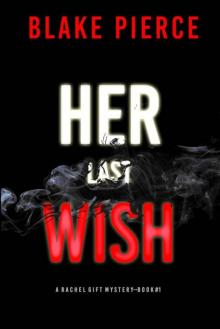 Her Last Wish (A Rachel Gift FBI Suspense Thriller—Book 1)
Her Last Wish (A Rachel Gift FBI Suspense Thriller—Book 1)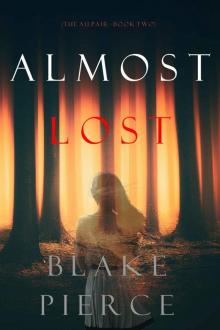 Almost Lost
Almost Lost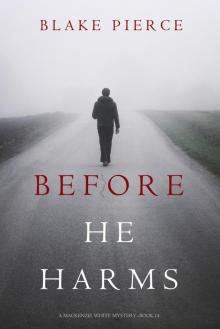 Before He Harms
Before He Harms Murder (and Baklava) (A European Voyage Cozy Mystery—Book 1)
Murder (and Baklava) (A European Voyage Cozy Mystery—Book 1) Left to Vanish (An Adele Sharp Mystery—Book Eight)
Left to Vanish (An Adele Sharp Mystery—Book Eight)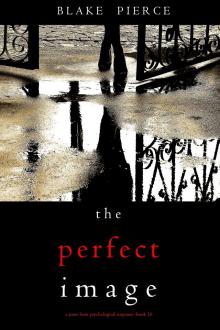 THE PERFECT IMAGE
THE PERFECT IMAGE The Perfect Affair (A Jessie Hunt Psychological Suspense Thriller—Book Seven)
The Perfect Affair (A Jessie Hunt Psychological Suspense Thriller—Book Seven)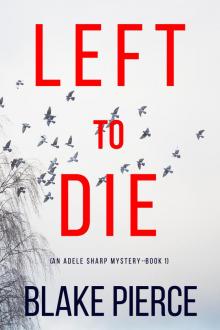 Left To Die
Left To Die BEFORE HE LAPSES
BEFORE HE LAPSES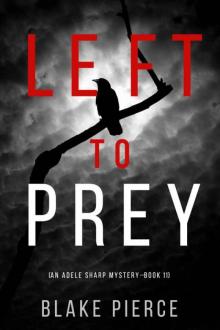 Left to Prey (An Adele Sharp Mystery—Book Eleven)
Left to Prey (An Adele Sharp Mystery—Book Eleven) The Perfect Neighbor (A Jessie Hunt Psychological Suspense Thriller—Book Nine)
The Perfect Neighbor (A Jessie Hunt Psychological Suspense Thriller—Book Nine)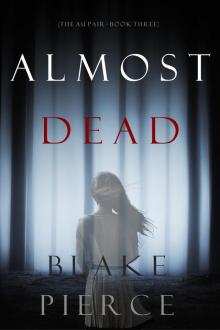 Almost Dead
Almost Dead The Perfect Wife
The Perfect Wife The Perfect Smile
The Perfect Smile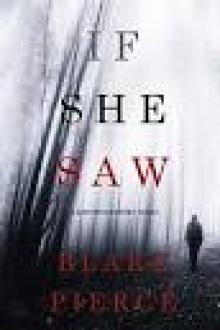 If She Saw
If She Saw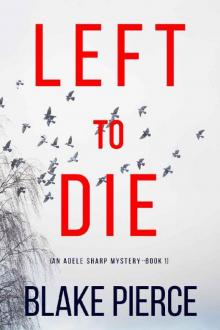 Left To Die (An Adele Sharp Mystery—Book One)
Left To Die (An Adele Sharp Mystery—Book One)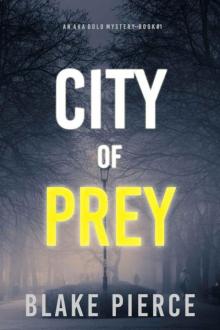 City of Prey: An Ava Gold Mystery (Book 1)
City of Prey: An Ava Gold Mystery (Book 1)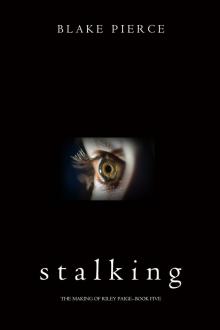 Stalking
Stalking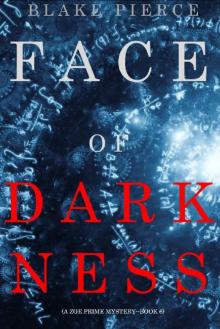 Face of Darkness (A Zoe Prime Mystery—Book 6)
Face of Darkness (A Zoe Prime Mystery—Book 6) The Perfect Mistress (A Jessie Hunt Psychological Suspense Thriller—Book Fifteen)
The Perfect Mistress (A Jessie Hunt Psychological Suspense Thriller—Book Fifteen) Girl, Vanished (An Ella Dark FBI Suspense Thriller—Book 5)
Girl, Vanished (An Ella Dark FBI Suspense Thriller—Book 5) The Perfect Block
The Perfect Block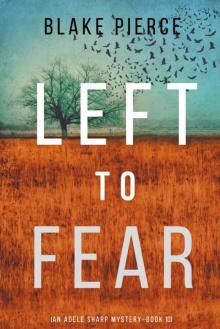 Left to Fear (An Adele Sharp Mystery—Book Ten)
Left to Fear (An Adele Sharp Mystery—Book Ten)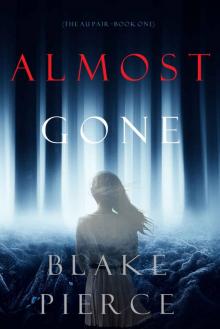 Almost Gone (The Au Pair—Book One)
Almost Gone (The Au Pair—Book One) The Perfect Facade (A Jessie Hunt Psychological Suspense Thriller—Book Twelve)
The Perfect Facade (A Jessie Hunt Psychological Suspense Thriller—Book Twelve) The Perfect Affair
The Perfect Affair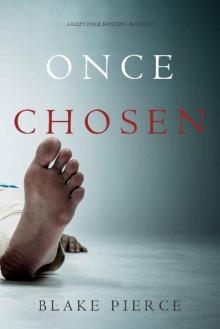 Once Chosen (A Riley Paige Mystery—Book 17)
Once Chosen (A Riley Paige Mystery—Book 17) Girl, Alone (An Ella Dark FBI Suspense Thriller—Book 1)
Girl, Alone (An Ella Dark FBI Suspense Thriller—Book 1)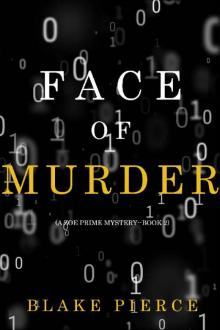 Face of Murder (A Zoe Prime Mystery—Book 2)
Face of Murder (A Zoe Prime Mystery—Book 2) The Perfect Mistress
The Perfect Mistress Crime (and Lager) (A European Voyage Cozy Mystery—Book 3)
Crime (and Lager) (A European Voyage Cozy Mystery—Book 3)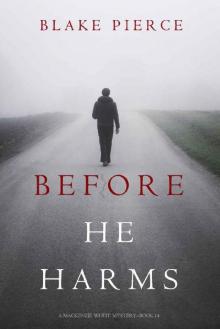 Before He Harms (A Mackenzie White Mystery—Book 14)
Before He Harms (A Mackenzie White Mystery—Book 14)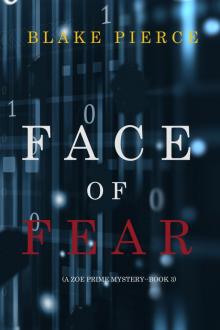 Face of Fear
Face of Fear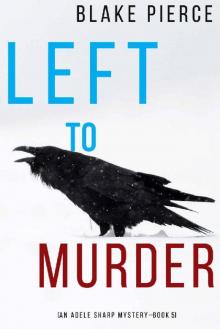 Left to Murder (An Adele Sharp Mystery—Book Five)
Left to Murder (An Adele Sharp Mystery—Book Five) Left to Vanish
Left to Vanish The Perfect Secret (A Jessie Hunt Psychological Suspense Thriller—Book Eleven)
The Perfect Secret (A Jessie Hunt Psychological Suspense Thriller—Book Eleven) The Perfect Deceit (A Jessie Hunt Psychological Suspense Thriller—Book Fourteen)
The Perfect Deceit (A Jessie Hunt Psychological Suspense Thriller—Book Fourteen)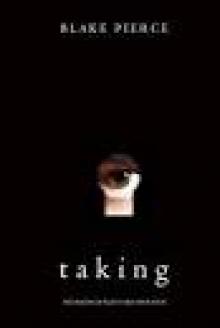 Blake Pierce - The Making of Riley Paige - 4 - Taking
Blake Pierce - The Making of Riley Paige - 4 - Taking Death (and Apple Strudel) (A European Voyage Cozy Mystery—Book 2)
Death (and Apple Strudel) (A European Voyage Cozy Mystery—Book 2) THE PERFECT HOUSE
THE PERFECT HOUSE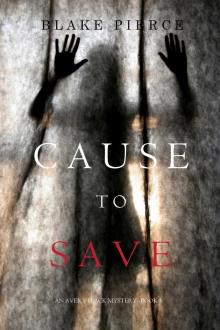 Cause to Save
Cause to Save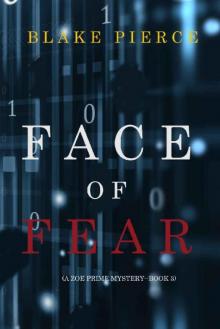 Face of Fear (A Zoe Prime Mystery—Book 3)
Face of Fear (A Zoe Prime Mystery—Book 3)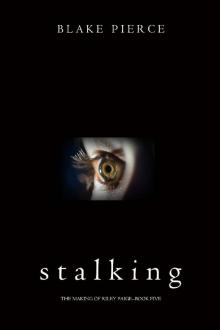 Stalking (The Making of Riley Paige—Book 5)
Stalking (The Making of Riley Paige—Book 5) A Neighbor's Lie
A Neighbor's Lie The Perfect Neighbor
The Perfect Neighbor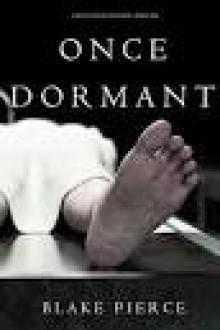 Once Dormant
Once Dormant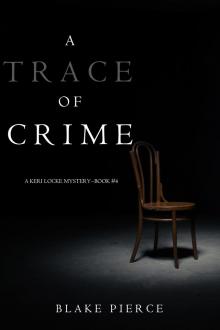 A Trace of Crime
A Trace of Crime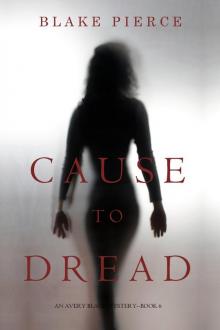 CAUSE TO DREAD
CAUSE TO DREAD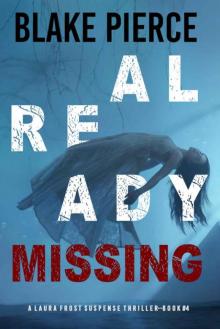 Already Missing (A Laura Frost FBI Suspense Thriller—Book 4)
Already Missing (A Laura Frost FBI Suspense Thriller—Book 4) Waiting
Waiting If She Knew
If She Knew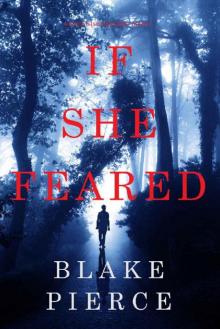 If She Feared (A Kate Wise Mystery—Book 6)
If She Feared (A Kate Wise Mystery—Book 6)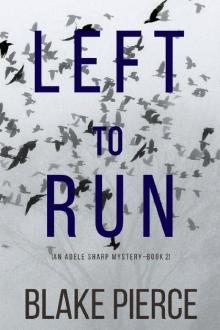 Left To Run (An Adele Sharp Mystery—Book Two)
Left To Run (An Adele Sharp Mystery—Book Two)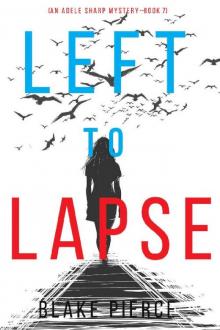 Left to Lapse (An Adele Sharp Mystery—Book Seven)
Left to Lapse (An Adele Sharp Mystery—Book Seven) If She Hid (A Kate Wise Mystery—Book 4)
If She Hid (A Kate Wise Mystery—Book 4) The Perfect Alibi (A Jessie Hunt Psychological Suspense Thriller—Book Eight)
The Perfect Alibi (A Jessie Hunt Psychological Suspense Thriller—Book Eight)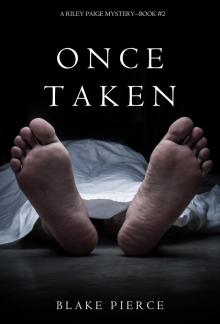 Once Taken
Once Taken Before He Envies
Before He Envies Before He Sins
Before He Sins Mackenzie White 07-Before He Sins
Mackenzie White 07-Before He Sins ONCE BOUND
ONCE BOUND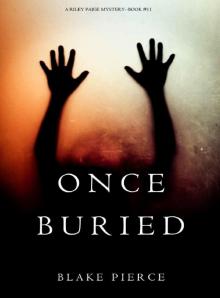 Once Buried
Once Buried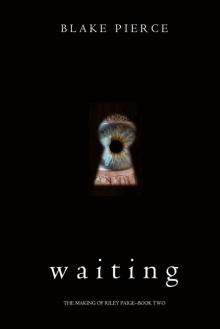 Waiting (The Making of Riley Paige—Book 2)
Waiting (The Making of Riley Paige—Book 2)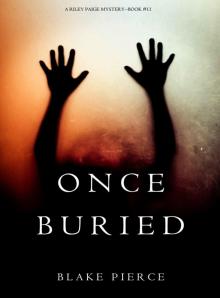 Riley Paige 11-Once Buried
Riley Paige 11-Once Buried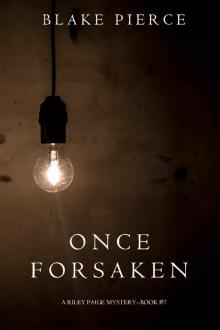 Once Forsaken (A Riley Paige Mystery—Book 7)
Once Forsaken (A Riley Paige Mystery—Book 7)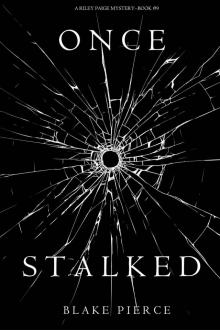 Once Stalked (A Riley Paige Mystery—Book 9)
Once Stalked (A Riley Paige Mystery—Book 9) The Perfect Disguise (A Jessie Hunt Psychological Suspense Thriller—Book Ten)
The Perfect Disguise (A Jessie Hunt Psychological Suspense Thriller—Book Ten)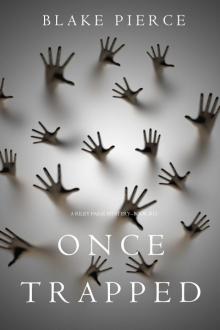 ONCE TRAPPED
ONCE TRAPPED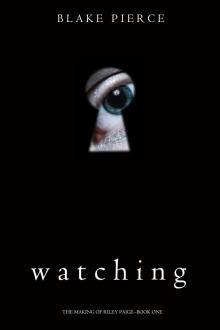 Watching
Watching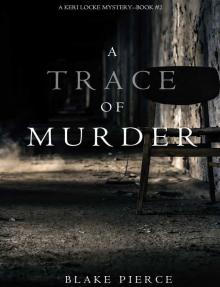 Keri Locke 02-A Trace of Muder
Keri Locke 02-A Trace of Muder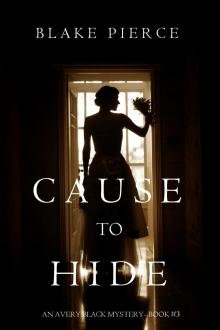 Cause to Hide
Cause to Hide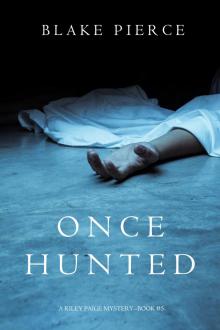 Once Hunted
Once Hunted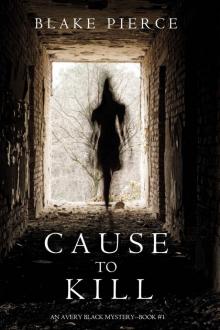 Cause to Kill (An Avery Black Mystery—Book 1)
Cause to Kill (An Avery Black Mystery—Book 1)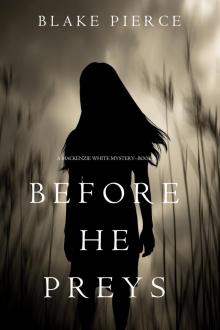 Before He Preys
Before He Preys Once Pined
Once Pined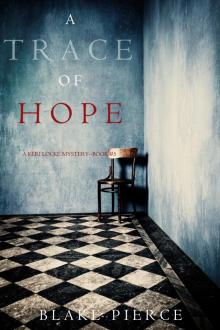 A Trace of Hope
A Trace of Hope Once Craved (a Riley Paige Mystery--Book #3)
Once Craved (a Riley Paige Mystery--Book #3)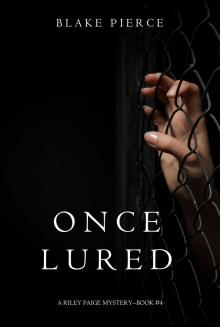 Once Lured
Once Lured Before He Sees (A Mackenzie White Mystery—Book 2)
Before He Sees (A Mackenzie White Mystery—Book 2) Before he Kills (A Mackenzie White Mystery—Book 1)
Before he Kills (A Mackenzie White Mystery—Book 1)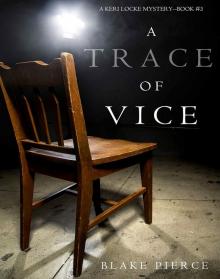 Keri Locke 03-A Trace of Vice
Keri Locke 03-A Trace of Vice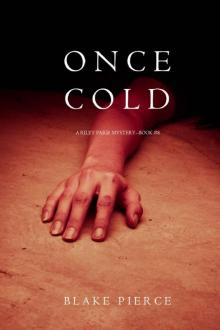 Once Cold
Once Cold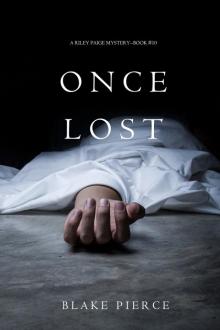 ONCE LOST
ONCE LOST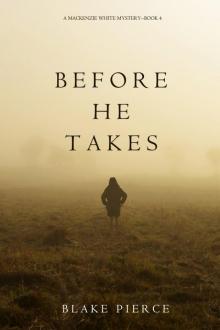 Before He Takes
Before He Takes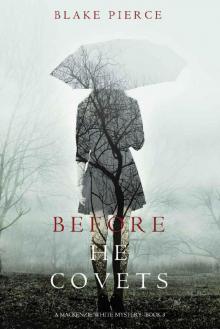 Before He Covets (A Mackenzie White Mystery—Book 3)
Before He Covets (A Mackenzie White Mystery—Book 3) BEFORE HE NEEDS
BEFORE HE NEEDS